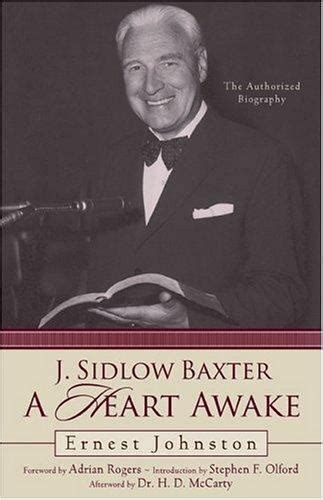A Quote by J. Sidlow Baxter
I have said it many a time, and am surer of it than ever, that the life and death issue of Christianity is the inspiration and authority of the Bible.
Quote Topics
Related Quotes
I let go of the notion that the Bible is a divine product. I learned that it is a human cultural product, the product of two ancient communities, biblical Israel and early Christianity. As such, it contained their understandings and affirmations, not statements coming directly or somewhat directly from God. . . . I realized that whatever "divine revelation" and the "inspiration of the Bible" meant (if they meant anything), they did not mean that the Bible was a divine product with divine authority.
Of the Divine character of the Bible, I think, no man who deals honestly with his own mind and heart can entertain a reasonable doubt, For myself, I must say, that having for many years made the evidences of Christianity the subject of close study, the result has been a firm and increasing conviction of the authenticity and plenary inspiration of the Bible. It is indeed the Word of God.
When you look at the Bible, and I read the Bible very seriously, for a lot of my life, I believed the Bible ordained the death penalty, and the Bible seemed to be very clear about that. But the more I look, the more troubled I became because it's not that simple. In the Bible, there's some 30 death-worth crimes, like working on the Sabbath, or disrespecting your parents. Are we that fundamental that we should bring back that death penalty?
There is more Bible buying, Bible selling, Bible printing and Bible distributing than ever before in our nation. We see Bibles in every bookstore - Bibles of every size, price and style. There are Bibles in almost every house in the land. But all this time I fear we are in danger of forgetting that to HAVE the Bible is one thing, and to READ it quite another.
Rediscovering the controversies that occupied early Christianity sharpens our awareness of the major issue in the whole debate, then and now: What is the source of religious authority? For the Christian the question takes more specific form: What is the relation between the authority of ones own experience and that claimed for the scriptures, the ritual and the clergy?
The trouble today is that many Christians live in a kind of bubble of assumptions about what their Christianity means, especially if it places them comfortably among "the good guys," - assumptions that are likely to be drawn as much from folk-Christianity, surrounding political culture, popular pulp-books about the "End Times," or their favourite guru writer or therapist, than from sober and comprehensive reading of the Bible as a whole. Prophets and preachers have the unwelcome task of pricking that bubble with the sharpness of actual texts and teachings of the Bible itself.
I guess it happens. What - Marco actually gave me cover, because he actually said the same thing, and he said it during the debate, that he was lying. So, I just said you can't say things which are lies and claim Christianity. You just can't do it. I just don't think it's good. I'm not questioning his Christianity. I just think it's inappropriate to hold up the Bible and lie.


































